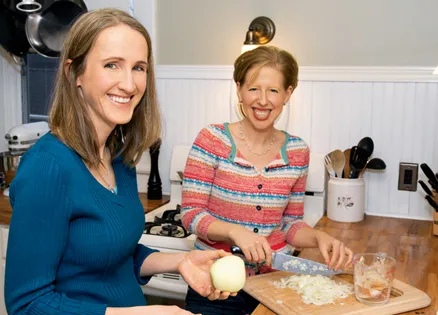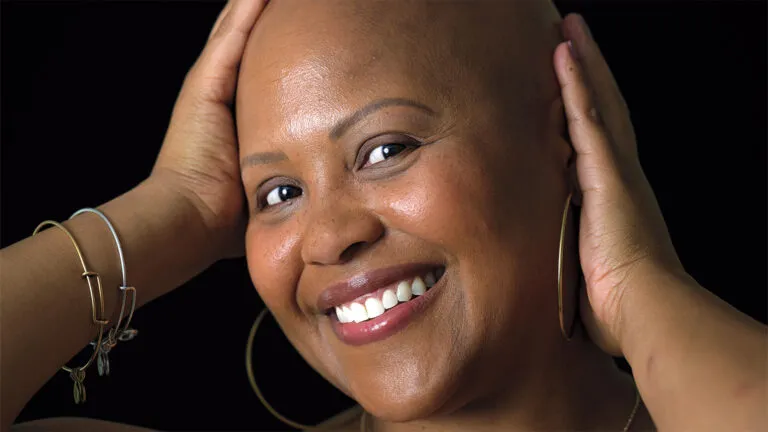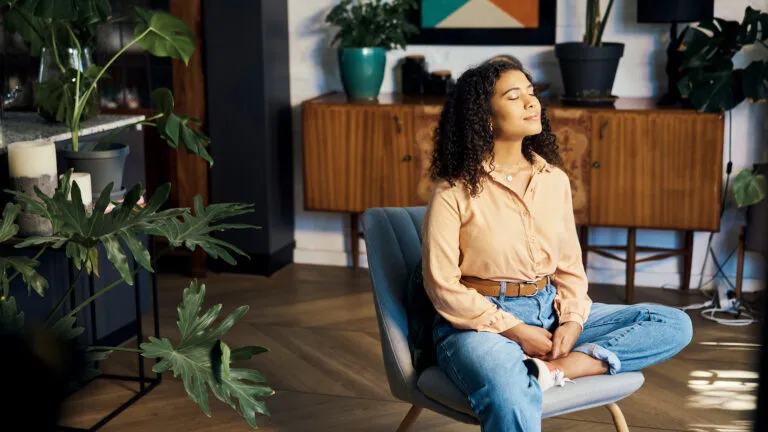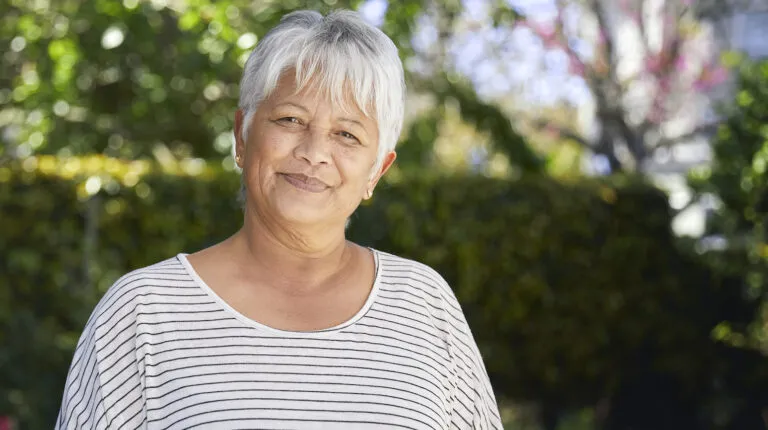I dutifully stacked my Lean Cuisines in the freezer of my new grad-school rental house. Fourteen of them. Two weeks’ worth of dinners already made, every calorie, every fat gram accounted for. Baked chicken, 240 calories. Lasagna, 320 calories. Chicken and vegetables, 220 calories.
I closed the freezer door and turned. My new roommate, Emily, was staring at me.
“Is that really what you eat?” she said.
“Well, um…” I was embarrassed, but I had to be honest. “Yes.”
I wanted to share more, but didn’t have the words. How could I explain how unhappy I was? How I’d come here to Ohio, enrolled in this graduate theology program because I was desperate for answers? I was only 26, yet I felt as if my life was winding down instead of just starting up.
The energy had drained from me so that I’d had to quit my job. I ran at least five miles every day. But then the next morning it nearly killed me to climb a flight of stairs, my body weak, exhausted, and cold, constantly cold. I needed one thing I could depend on, that I could have under control. My diet.
But Emily already understood.
“I get it,” she said. “But you’re not going to eat those anymore.”
Now, what did that mean? I’d been eating boxed food for most of my adult life. How could I suddenly stop?
But that was a conversation for another time. Today I just wanted to get my run in, at least six miles. For that I’d give myself a reward of two and a half (never three) pretzel rods, 90 calories. For 10 miles, when I really went all out, I got one chocolate chip muffin, 220 calories.
It all started, I suppose, with an offhand comment when I was an undergrad. “Have you lost weight?” a friend asked. “You look good.” I hadn’t been doing anything special. But maybe I needed to.
I began eating the same thing every day so I would know precisely how many calories I was consuming: cereal for breakfast (three-quarters of a cup, the serving size on the box), a sesame bagel with low-fat cream cheese for lunch and a frozen microwaveable dinner.
By the time I graduated, I’d dropped two sizes. I’d figured out the perfect diet. I just had to stick with it.
I got a job teaching just outside my hometown, Potomac, Maryland. Ran every day after work. Took dance classes. I filled my prayer journal with thanks for the many blessings God had given me. A good job, good health, a loving family.
But slowly the blessings got harder to see. I was thinner than ever, but no matter how much I ran, I didn’t feel fitter. If anything I was getting weaker. It was hard to even think, as if my brain were running out of gas.
I went to doctors. Nothing turned up in blood work or other tests. My mother was really worried. One day she had me make an appointment with a nutritionist.
The nutritionist asked me to list everything I ate in a week. Her expression turned from puzzled to concerned. “You’re not eating nearly enough for your active lifestyle,” she said. “When you’re this controlling about your diet”—she looked straight into my eyes—“you are not in control.”
Was she saying I was the problem? How could that be when I was trying so hard? At the end of the school year I quit my job. I couldn’t keep teaching. It took everything I had just to get my daily run in. I didn’t know where my life was going. Some days I barely had the energy to care.
I tried to think of a place, a time when I’d felt God near. Then I remembered. Franciscan University in Steubenville, Ohio, where I’d gone for summer retreats years ago. I felt an overwhelming, almost magnetic pull, drawing me to this campus 300 miles from home.
I enrolled in the theology program. But how would I find the strength?
I told the principal at my former school my plans. “You should meet our new kindergarten teacher,” she said. Her sister Emily was in the same program and she was looking for a roommate.
Now here I was in Steubenville, just days away from starting classes. By the time I logged my six miles, I really wanted those pretzel rods. They wouldn’t fill me up, but then again, nothing did.
I opened the front door and…that smell. It was incredibly enticing. My mouth watered. I peeked in the kitchen. Emily was at the stove. “Oh good,” she said. “You’re back. I’m sautéing some onion and garlic. Forget the frozen dinners. Tonight we’re having pasta with sausage and peppers. Great for runners.”
We? I thought. But there was something in her voice, warm and inviting. I couldn’t refuse. The pasta was good, really good. Still, I didn’t want to overdo it. I watched in amazement as Emily polished off her entire plate. But she was fit! How could she eat this rich food and still be a healthy weight?
While I was obsessing over the calories, Emily was just enjoying the conversation. Everything about her seemed unhurried, carefree. So different from how I felt.
Then she shared her story with me. “For years I was anorexic,” she said. She’d craved food so much that, in place of eating, she read recipes. “After consuming enough cookbooks, I started cooking for my friends. I realized that food is a blessing and a gift from God, meant to be shared. That’s why I cooked for you.”
A blessing? A gift from God? I’d always thought of food as an indulgence.
“Next time, we’ll make something together,” Emily said. “Cooking is easy, once you learn a few basics.”
“Easy?” I laughed. I could barely cook a hot dog.
But Emily had a way of making people do things they never thought they could, and no one was more surprised than I was to find myself days later at the kitchen counter with an apron on. “Now, be sure to squeeze all the water out of that spinach,” Emily said, demonstrating every step while we made spinach-onion pierogis.
I had to admit, with Emily’s guidance, it was sort of easy. Fun, really. And the pierogis were amazing. My frozen baked chicken sat in the freezer, completely forgotten. “I want to cook for you four nights a week, and then we’ll have leftovers twice a week,” Emily said. “On Sundays we’ll cook together.”
“Okay,” I said. Actually, I’d always wanted to learn how to cook.
Then the old fears set in: Who would choose what we ate? How would I keep track of calories? Of fat grams? It was scary and exciting all at the same time—as if I’d taken too big a step, followed Emily down a path that led who knew where.
Meal by meal our friendship grew. Emily used ingredients I’d never heard of: Arborio rice, pine nuts, feta cheese. In the kitchen, we created and concocted. With each passing week, food became a source of joy instead of anxiety.
Cooking wasn’t all Emily and I did, of course. We read the Bible and studied together. We curled up with our favorite authors during snowstorms. We invited friends over for dinner, all of us crowded around the table, laughing and talking about dating, music, theology, books we’d read, professors we liked.
One night when we were alone, Emily and I finally talked openly about my eating disorder.
“It’s not about being thin,” she said. “It’s about needing to control everything that goes into your mouth.” There was that word again. Control. I thought about how I’d put my diet and my running before everything else, thinking that would give me control over where my life was headed.
But really, only God could control that. All I’d succeeded in doing was starving myself. Not only my body. My mind and spirit too. That was what I hungered for more than anything, spiritual nourishment.
“My Lord,” I wrote in my prayer journal that night, “I need to care for the body you’ve given me by nourishing it. Please, please put in my heart the will to eat better.”
With Emily’s help, I worked on my food and control issues. And I started seeing a counselor. Little by little, I let go of the rituals that had chained me for so long. “Low-fat” food stopped tempting me. Real butter and whole milk were so much more satisfying.
I gained a little weight, yes. I needed to. Actually, I gained more than that: I gained energy. Strength. Warmth. Happiness.
One day, sorting through the clothes I’d outgrown, I started to get anxious. What would I wear now?
“Try this on,” said Emily, coming to the rescue with a skirt of hers she knew I liked, a size up. It fit perfectly. This getting-a-new-wardrobe thing might not be so bad. I put the old clothes in a box marked “Giveaways,” taping it shut.
It’s been 10 years since Emily banned TV dinners from my life. When the smell of sautéed garlic and onions fills my kitchen, I think of her, and the lessons she helped me learn.
I have no idea how many calories are in the dinners I cook for my husband and our three children, and I don’t care. The food I’m making is a blessing and a gift from God. That’s why I’m sharing it with my family.
God gave me something far better than a diet plan. I have a whole new outlook. And a dear friend who taught me a recipe I could never get enough of. It’s called life. And it practically makes itself. The less you stress over it, the more you open yourself to its abundance of flavors, the better it turns out.
Download your FREE ebook, Paths to Happiness: 7 Real Life Stories of Personal Growth, Self-Improvement and Positive Change





